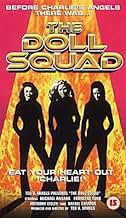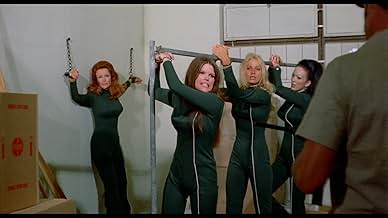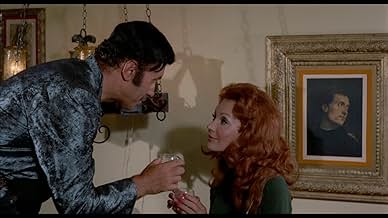IMDb RATING
4.4/10
1.2K
YOUR RATING
Squad of beautiful government agents tries to catch saboteurs.Squad of beautiful government agents tries to catch saboteurs.Squad of beautiful government agents tries to catch saboteurs.
- Director
- Writers
- Stars
Herb Robins
- Munson
- (as Herb Robbins)
Gustaf Unger
- Dr. Cahaymen
- (as Gustave Unger)
- Director
- Writers
- All cast & crew
- Production, box office & more at IMDbPro
Featured reviews
One of schlock film master Ted Mikels' best bad films. Not as famous or fun as the Astro Zombies, but certainly worth checking out. Mikels is said to have sued TV Mogul Aron Spelling over Doll Squad, claiming Spelling created "Charlie's Angels" based on this film! That gives Spelling way too much credit. Don't know what ever came of the law suit, but I would like to listen to Mikels' legal arguments! Typical Grade Z government actor types program a big secret super computer to choose the ideal squad of secret agents to save the world, and it comes up with 4 fighting bimbos for the job. They use their sex appeal and unconvincing martial art skills to get the bad guy and titilate the audience. Everything in the movie has a very brown-orange shag carpet 1970's look. I'm sure Mikels was the first on his block to get a leisure suit.
The only other Ted V. Mikels film I had seen before this is "Blood Orgy of the She-Devils". And the only thing I remember about it is that it was completely awful. Thankfully, "The Doll Squad" is considerably better. It is crudely directed, with often poor continuity and laughable "special effects" (low points: the fake explosions). But it is also ahead of its time: how many films do you suppose had been made before 1973 featuring female commandos using guns, explosives and martial arts to wipe out small armies of bad men? Not many, that's for sure. Whether dressed in their bikinis or in their tight, form-fitting uniforms, the women in this film look good, and handle their basic action scenes fairly well. So "The Doll Squad" may not be art (far from it, in fact), but from a female action cinema fan's perspective, it delivers where it counts. (**)
The Doll Squad pre-dates the hugely successful television series Charlie's Angels (1976 - 1981), and it's intentions are similar. After a catastrophic space shuttle launch, the clandestine group of government agents, must form to conquer this criminal conspiracy. Sabrina Kincaid (Francine York) is called to gather the scattered doll squad, a group of female agents. Practically all American films and television in the 1970's that involved crime were embroiled in conspiracy, from Starsky and Hutch (1975 - 1979), Police Woman (1974 - 1978) to The Amazing Spider-Man (1977 - 1979), and this film seems to have paved the way. It's certainly true that the producer of Charlie's Angels (Aaron Spelling) did go to the premier of The Doll Squad.
The films production is obviously incredibly low budget. Ted V. Mikels was previously known for the grindhouse cheapie's The Corpse Grinders (1971) and Blood Orgy of the She-Devils (1972), but this film's production values certainly rise above the limitations, and also look a lot better than the horror films. Where the film really fails is in the pace. It struggles through several clunky dialogue scenes, and often uses a piece of funky, disco-esque soundtrack (which is used far too much throughout the film) seemingly to attempt to give a dull scene a bit of pep - such as what appears to be either a fast walk down a long corridor, or a slow walk in a short one.
However, when the action does heighten, and that same piece of music is used appropriately, the film does have its moments of fun. It's always good to see the heavily made-up, statuesque '70's women beating up the weak men, from the women in prison movies, to proto-punk Switchblade Sisters (1975) - and of course their raison-d'etre, seduction. The film also boasts an appearance by Tura Satana, who was electric in Russ Meyer's Faster Pussycat. Kill! Kill! (1965). Whilst the film has it's lagging moments, and tedious dialogue, it doesn't ever really become boring. All the limitations actually function well within the context of the ludicrous scenes, and gives the film humour. A lasting example would be, of course, the technical effects for explosions. Mikels's solution? Superimpose a flare of red over the exploded object, then cutting object out: ridiculous, cheap-as-chips, hilarious!
The films production is obviously incredibly low budget. Ted V. Mikels was previously known for the grindhouse cheapie's The Corpse Grinders (1971) and Blood Orgy of the She-Devils (1972), but this film's production values certainly rise above the limitations, and also look a lot better than the horror films. Where the film really fails is in the pace. It struggles through several clunky dialogue scenes, and often uses a piece of funky, disco-esque soundtrack (which is used far too much throughout the film) seemingly to attempt to give a dull scene a bit of pep - such as what appears to be either a fast walk down a long corridor, or a slow walk in a short one.
However, when the action does heighten, and that same piece of music is used appropriately, the film does have its moments of fun. It's always good to see the heavily made-up, statuesque '70's women beating up the weak men, from the women in prison movies, to proto-punk Switchblade Sisters (1975) - and of course their raison-d'etre, seduction. The film also boasts an appearance by Tura Satana, who was electric in Russ Meyer's Faster Pussycat. Kill! Kill! (1965). Whilst the film has it's lagging moments, and tedious dialogue, it doesn't ever really become boring. All the limitations actually function well within the context of the ludicrous scenes, and gives the film humour. A lasting example would be, of course, the technical effects for explosions. Mikels's solution? Superimpose a flare of red over the exploded object, then cutting object out: ridiculous, cheap-as-chips, hilarious!
Director Mikels claims this was the inspiration for "Charlie's Angels." Maybe so or maybe not, but this film turns out to be a fairly standard 3 girl/4 girl formula exploitation acioner. Some funny scenes, like the exploding enemy agents. Satana is wasted in a supporting role. This one probably satisfied the drive in crowd in 1973, but it doesn't have too much to recommend it now, even to fans (like me) of this stuff, because it's a bit too clunky.
Ted V Mikels is a kitsch director whose best work rises above practical efforts at criticism. He produced the films most highly regarded amongst a coterie of fans over just few years: The Astro Zombies' (1969), The Corpse Grinders' (1972), and Blood Orgy of The She Devils' (1972), each have their following and have endured on video. As the last of Mikel's trash favourites to appear, 'The Doll Squad' contains the least horror and fantasy and, in comparison to it's predecessors, adheres more closely to a logical dramatic structure. Since then, although he had remained active - most recently with Dimension of Fear' (1998) - Mikels has produced nothing else regarded by fans with such long-lived affection. Firmly in the realms of so-bad-it's-good, the years have added an enjoyable sheen to The Doll Squad', particularly now that it can be taken with the gloss of post-modern irony.
This is the film whose central premise - Mikels allegedly claimed - was ripped off by producer Aron Spelling to become the television series Charlie's Angels'. No doubt the reissue of Doll Squad' has also been at least in part inspired by the commercial success and marketing of the big screen version of that programme. Comparison of Mikels' film with Spelling's work does reveal similarities. But nothing in the TV Charlie's Angels', or the recent Hollywood outing compares to Mikel's wide-eyed glance at the genre, the cheesy pulchritude on display and his disregard for dramatic standards.
The Doll Squad is selected for assignment by computer, after it picks up 'something in O'Riley's personality which means experienced women should do the job' of stopping him. 'Experience' in this context naturally implies more than just familiarity with tough assignments. The squad of Sabrina, Liz, Sharon, Lavelle and Kim hail from different backgrounds, including a librarian, a scientist, karate instructor and, most noticeably, erotic dancer (played by Tura Satana, the Apache-Japanese better known for her role in Russ Meyer's far more provocative 'Faster Pussy Cat, Kill Kill!' (1965)).
It might be argued that, as a group of strong assertive women, the Doll Squad is a model of feminine self-reliance. After all, they are empowered to find and stop the villainous O'Riley by a senator, and are allowed complete independence and licence for the duration of their mission. But their assertiveness is essentially apolitical and, except for their expected impact on the criminal community, always non-threatening and contained within fantasy. The choice of squad personnel, obviously intended as a cross section of female society, merely emphasises a common voluptuousness. In tandem with the women's physical stamina, Mikel creates through this all-too familiar trash archetypes
Leaving aside its relationship to 'Charlie's Angels', the most striking element of Mikels' film is its flat playfulness. Like most favourite cult trash directors, he is cheerfully oblivious to the handicaps of abilities and material. For the viewer, of course this is part of the fun. It would be pointless here to refer in detail to the fluffed lines, one-dimensional plot and rudimentary cutting and pacing. Instead, a viewer best engages with the film on a naïve level, such (presumably) as the director/producer/co writer did, or by assuming a knowing camp sophistication. There's more than a degree of that to be found in the flame-thrower cigarette lighter, for instance, the lame kung fu, or the exploding poison. These days The Doll Squad' is more likely to leave the knowing viewer with a wink than a grimace, as it plays its simple variation on the espionage thriller. As a z-grade auteur, Mikels, resolutely goes his own way in the film, immune to the strictures of any responsible' judgement, incidentally striking a chord with the modern viewer which he could hardly had anticipated at the time.
However one approaches the film, it still has the distinct straight-faced charm which has kept it a favourite down the years. Helped by a surprisingly strong musical score, and photographed competantly, The Doll Squad', beehive hair cuts and cheesy décor intact, has dated pleasantly and remains a guilty pleasure.
This is the film whose central premise - Mikels allegedly claimed - was ripped off by producer Aron Spelling to become the television series Charlie's Angels'. No doubt the reissue of Doll Squad' has also been at least in part inspired by the commercial success and marketing of the big screen version of that programme. Comparison of Mikels' film with Spelling's work does reveal similarities. But nothing in the TV Charlie's Angels', or the recent Hollywood outing compares to Mikel's wide-eyed glance at the genre, the cheesy pulchritude on display and his disregard for dramatic standards.
The Doll Squad is selected for assignment by computer, after it picks up 'something in O'Riley's personality which means experienced women should do the job' of stopping him. 'Experience' in this context naturally implies more than just familiarity with tough assignments. The squad of Sabrina, Liz, Sharon, Lavelle and Kim hail from different backgrounds, including a librarian, a scientist, karate instructor and, most noticeably, erotic dancer (played by Tura Satana, the Apache-Japanese better known for her role in Russ Meyer's far more provocative 'Faster Pussy Cat, Kill Kill!' (1965)).
It might be argued that, as a group of strong assertive women, the Doll Squad is a model of feminine self-reliance. After all, they are empowered to find and stop the villainous O'Riley by a senator, and are allowed complete independence and licence for the duration of their mission. But their assertiveness is essentially apolitical and, except for their expected impact on the criminal community, always non-threatening and contained within fantasy. The choice of squad personnel, obviously intended as a cross section of female society, merely emphasises a common voluptuousness. In tandem with the women's physical stamina, Mikel creates through this all-too familiar trash archetypes
Leaving aside its relationship to 'Charlie's Angels', the most striking element of Mikels' film is its flat playfulness. Like most favourite cult trash directors, he is cheerfully oblivious to the handicaps of abilities and material. For the viewer, of course this is part of the fun. It would be pointless here to refer in detail to the fluffed lines, one-dimensional plot and rudimentary cutting and pacing. Instead, a viewer best engages with the film on a naïve level, such (presumably) as the director/producer/co writer did, or by assuming a knowing camp sophistication. There's more than a degree of that to be found in the flame-thrower cigarette lighter, for instance, the lame kung fu, or the exploding poison. These days The Doll Squad' is more likely to leave the knowing viewer with a wink than a grimace, as it plays its simple variation on the espionage thriller. As a z-grade auteur, Mikels, resolutely goes his own way in the film, immune to the strictures of any responsible' judgement, incidentally striking a chord with the modern viewer which he could hardly had anticipated at the time.
However one approaches the film, it still has the distinct straight-faced charm which has kept it a favourite down the years. Helped by a surprisingly strong musical score, and photographed competantly, The Doll Squad', beehive hair cuts and cheesy décor intact, has dated pleasantly and remains a guilty pleasure.
Did you know
- TriviaIt is speculated that Aaron Spelling got the idea for Drôles de dames (1976) after attending the premier of this film.
- GoofsThe finale of the film supposedly takes place on a remote island off the coast of South America, yet the vehicles driven by the bad guys bear Montana license plates.
- Alternate versionsThe film was originally shown in two versions, both possibly uncut, with different posters aiming at different markets: The Doll Squad, rated PG, distributed by Geneni Film; and Seduce and Destroy, rated R, by Dinero Productions.
- ConnectionsFeatured in The Wild World of Ted V. Mikels (2008)
- How long is The Doll Squad?Powered by Alexa
Details
- Release date
- Country of origin
- Language
- Also known as
- Anti-Gang et Séduction
- Filming locations
- Glendale, California, USA(Compound)
- Production company
- See more company credits at IMDbPro
Contribute to this page
Suggest an edit or add missing content




























